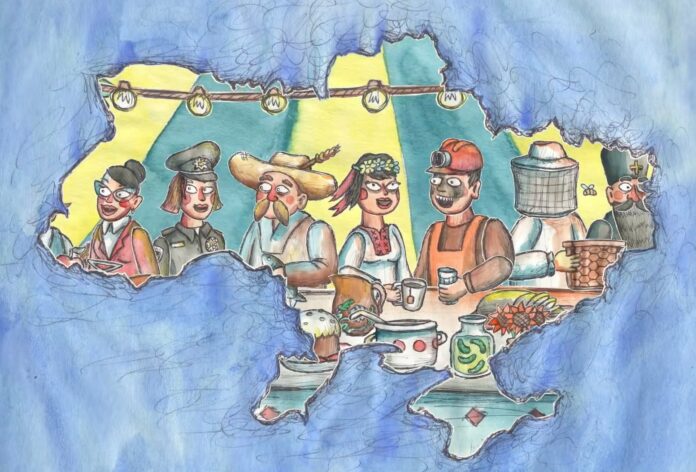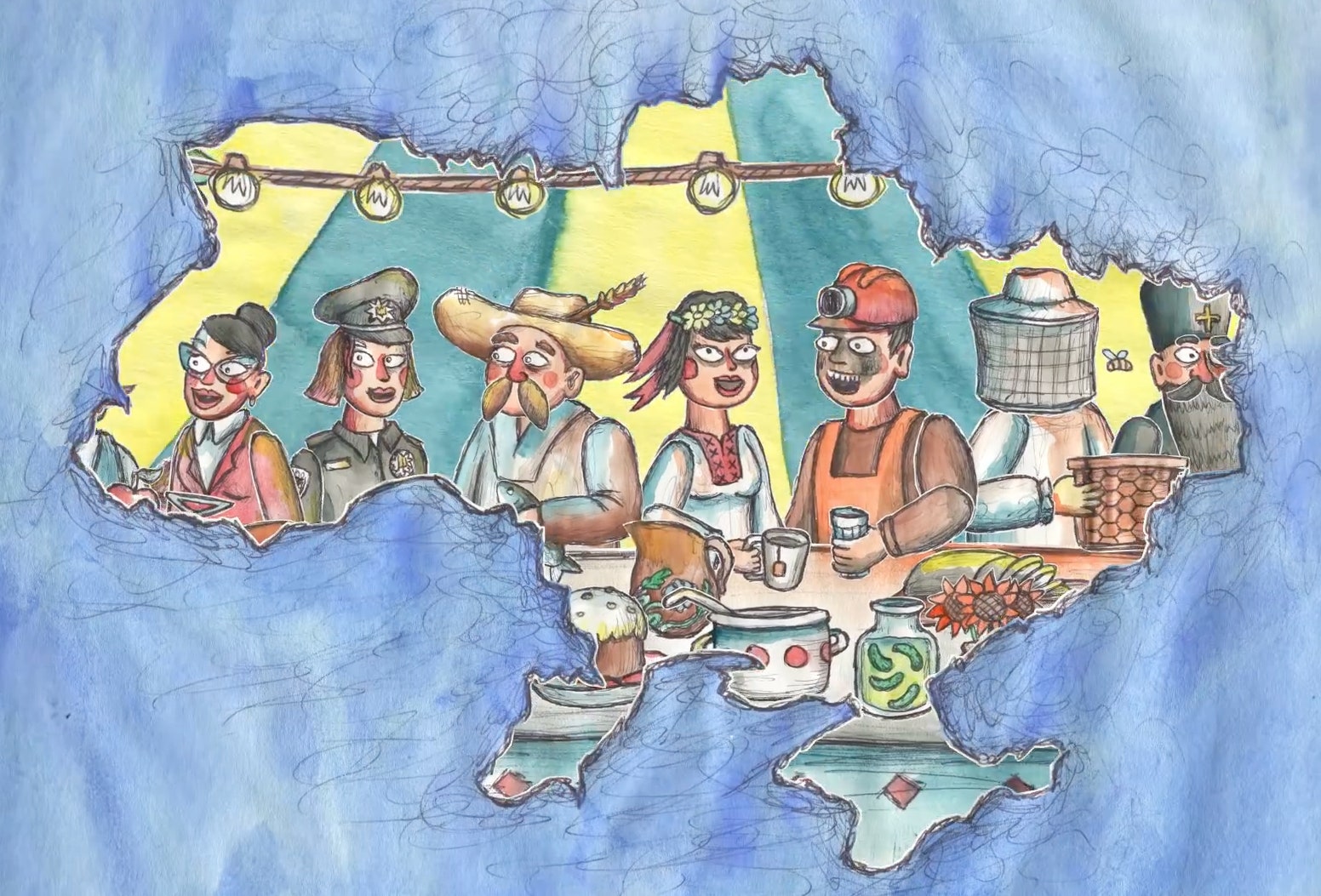In a July 12, 2021 essay that caused a stir among security analysts, Vladimir Putin considered the Russian and Ukrainian peoples to be one. He almost explicitly denied Kyiv’s right to independence, thirty years after it had regained it. He has legitimized his aggression against Ukraine and, by the same token, any future aggression. These words are hardly new and they have some variations, notably in the name of orthodoxy, of which Moscow considers itself the guardian. It has also been noted that this speech has some resonance with Hitler’s remarks about the Sudeten Germans. On the other hand, it has not been sufficiently pointed out that such a discourse could receive a favorable reception from certain “geopoliticians” in the West.
Nous n’entrerons pas ici dans un commentaire ligne à ligne de l’article de Poutine dont les auteurs ont choisi une formulation aussi alambiquée qu’indigeste. Il faut donc moins le lire par agrément que parce qu’il est un condensé fastidieux de la plupart des récits habituels auxquels le régime de Poutine nous avait habitués. Que Poutine ait choisi ce moment précis pour le rendre public n’est d’ailleurs pas anecdotique.
Unsurprising revisionism
A good half of it is a rehash of the classic Kremlin propaganda on Ukraine: the aggression of the West and its support for the Maidan Revolution, the defense of the inhabitants of the Donetsk and Luhansk regions against the aggression in front of Kyiv, the myth of “separatists”, the reference to neo-Nazi movements in Ukraine (while the extreme right in Ukraine accounts for less than 2% of the votes cast in all the last elections), the alleged ban on learning and speaking the Russian language, the considerable aid provided by Russia and Ukraine, the West refused any call for dialogue from Moscow, etc.
Logically enough, this statement goes hand in hand with a rewriting of history that is akin to revisionism: the absence of Russian aggression against Ukraine, the bloody crimes against Russian-speaking Ukrainians, the control of NATO and the West over Ukraine’s military infrastructure, the near-destruction of the Moscow Patriarchate in Ukraine, which is denied to be an instrument of Moscow’s influence, etc. On the historical level, Putin considers that the events of the 1930s — read the Holodomor or “great famine” — were events common to the Soviet space due to the collectivization of land and that there was no will of destruction by Stalin of the Ukrainian people. He also denies the oppression of the Soviet occupation and does not mention the deportation and extermination of the Crimean Tatars. In short, the “anti-Russian sentiment” in Ukraine is only due to an action fomented by the West and supported by the Ukrainian “Nazis”. And with the utmost cynicism he blames the more than 13,000 deaths in the war in Ukraine on the authorities in Kyiv and the Western countries. Of course, he claims with the same aplomb that the people of Crimea voted freely in a referendum in 2014 on its membership in Russia—it is well known that the vote had been completely rigged and was done under the control of the Russian armed forces.
A good part of the essay by the master of the Kremlin is devoted to a historical reading, which is by the way largely biased, of the ancient historical link, but also of the religious link, between Ukraine and Russia, which draws far from the mythologies quite commonly enunciated by the Russian propaganda. He does not spare himself the emphasis on the ties tied between the two countries by bloodshed. The fact that past history is in no way a justification in itself for the will expressed today by citizens who are members of a democratic state is precisely what the Kremlin intends to reject. It is not surprising that the paper by the former KGB spy contains elements of naturalism (blood), culturalism (a supposedly common ancient culture) and raw historicism (past history, revised to suit the intention of the narrator, has a decisive influence on the way it should be combined with the present).
The main idea of the text is expressed in one sentence: “The true sovereignty of Ukraine is possible only in partnership with Russia”, because “we are one people”*. No doubt Putin thought it appropriate to repeat this now, as if to show that he did not care about the West’s warnings about the situation in Ukraine or, perhaps more importantly, to mean that the weakness of these warnings was an encouragement to move forward. The many references to the Minsk agreements, which the Kremlin claims to approve — no doubt all the more easily because it is the violator — show that they consider them to be destined to have only one interpretation: their own, which is certainly opposed to any form of recovery by Ukraine of its territorial integrity. In short, as expected, he does not give an inch, but rather reaffirms his clear intention: to take full control of Ukraine, which he considers to be a “Russian thing”. Without this being mentioned in the text, it also constitutes a rather legible warning about Belarus: it is also mine by nature. We have a legitimate right to forge its destiny; for the West, it would be interference. Far from trying to feign appeasement—despite purely rhetorical protests about the free decisions of the Ukrainian people—he also clearly points to the enemy: the West.
Propaganda can work…
That this unsurprising text is aggressive, revisionist and expresses, according to its signatory, a long-term perspective with the air of saying “I have time for myself”, is one thing. That it has alarmed once again, at a time when part of the West seems to be becoming even more disarmed in front of the Kremlin, a large part of the “strategic community”, is yet another. The fact that the regime’s official propagandists, both at home and abroad, are being fed stories — or talking points — to be reproduced in episodes, is hardly new. However, it is necessary to pay more attention to the way in which those whom I had called the “soft propagandists” can also seize upon it, without even, for some, paying much attention to it. Putin’s text meets, in fact, four received ideas that form a sort of conventional wisdom among part of the Western ruling class.
The first is that “of course Crimea is Russian, everyone knows that”. Anyone who frequents certain political circles, even non-extremist ones, has often heard this sentence, including the author of these lines on the sidelines of a hearing before a parliamentary assembly. It was not uttered by notoriously pro-Putin activists. Apart from its historical falsity, which, let us repeat, in a way is nonsense, it testified to the ease with which some are quick to replace the rule of law — it is an annexation by Moscow that violates all the rules of international law — by a supposed historical legitimacy. Coming from parliamentarians, this may seem somewhat inappropriate. Quite none of them speak loud and clear about the well-documented abuses by the Russian occupation forces against the Crimean Tatar minority. Under these conditions, Putin’s revisionism can score points.
The second commonplace concerns Ukraine as such. If you ask a large part of the public, even a moderately educated one, few will distinguish between Russia and Ukraine. Many do not know that there is still a war going on there, three hours from Paris, which has left at least 14,000 dead and 1.6 million displaced. Many citizens of Western Europe have not been to Ukraine, do not know its history and assimilate Russia and Ukraine in a distant “east”, erasing the revolutions, Orange (2005) and Maidan (2014) that took place in this second country precisely in the name of European values. The leaders of Western Europe have a major responsibility in this ignorance for not having spoken clearly enough about the Russian aggression and the struggle of the Ukrainian people. Here too, Putin’s text risks joining a common opinion that “Russia and Ukraine are the same thing”, thus erasing the country’s independence and its struggles for rule of law and freedom.
The third entry in this dictionary of received ideas is linked to a certain geopolitical rhetoric that is frequent in certain circles that claim to deal with strategy and international relations. This one implicitly admits that, finally, “even if we can regret it” (they concede), the “reality of the world” would make that the big States would have rights on the smallest ones (what would be Ukraine, however about the same size as France). The other big states—read the three democratic members of the P5 or the G7 countries—should first deal with the other “big” ones, even if they are not democratic. They would have to discuss “serious matters” with them and, in a way, the “claims” of the small states would be a kind of encumbrance. In the end, the “small nations” Milan Kundera spoke of have no voice in the decision. In a way, according to this narrative, it would be natural for them to be the losers of history — Vae victis! Listening to certain comments, especially in France and Germany, one sometimes gets the feeling that some people are suggesting that we should get rid of these obstacles to progress and therefore give in to Russia, in order to get out of the “Ukrainian conflict”—in short, turn the page. It is clear that the Kremlin intends to play on this feeling, especially within the weak links that France and, even more so, Germany seem to it.
Finally, the fourth idea, which contributes to the lack of differentiation between Russia and Ukraine, is linked to the conception popularized by Samuel Huntington of a pole of “Orthodox” civilization. It was, in fact, according to him, a form of “identity” that would characterize this area, bringing together in a kind of quintessential unity the countries practicing this religion. The differences between the churches, their conflicts, the close link between some of these churches and the government — Huntington had written The Clash of Civilizations before Putin came to power — and the freedom of conscience of each person would not matter—this supposedly ancestral religious link would be primary. Putin plays on this rhetoric in his article, which also serves to condemn the independence of the Ukrainian Orthodox Church of the Kyiv Patriarchate, recognized by the Patriarchate of Constantinople as an autocephalous church. The fact remains that Huntington’s thesis, which has become a commonplace posthumously, feeds the thesis of the indifference between Ukraine and Russia.
It is high time for responsible governments to provide the necessary counter-narratives to these narratives. But they must be capable of understanding or simply of thinking.
International and security affairs analyst, former head of department at the General Planning Commission, lecturer at Sciences-Po Paris, author of three official reports to the government and 22 books, including Quand la France disparaît du monde (Grasset, 2008), Le Monde à l'horizon 2030. La règle et le désordre (Perrin, 2011) and, with R. Jahanbegloo, Resisting Despair in Confrontational Times (Har-Anand, 2019)




